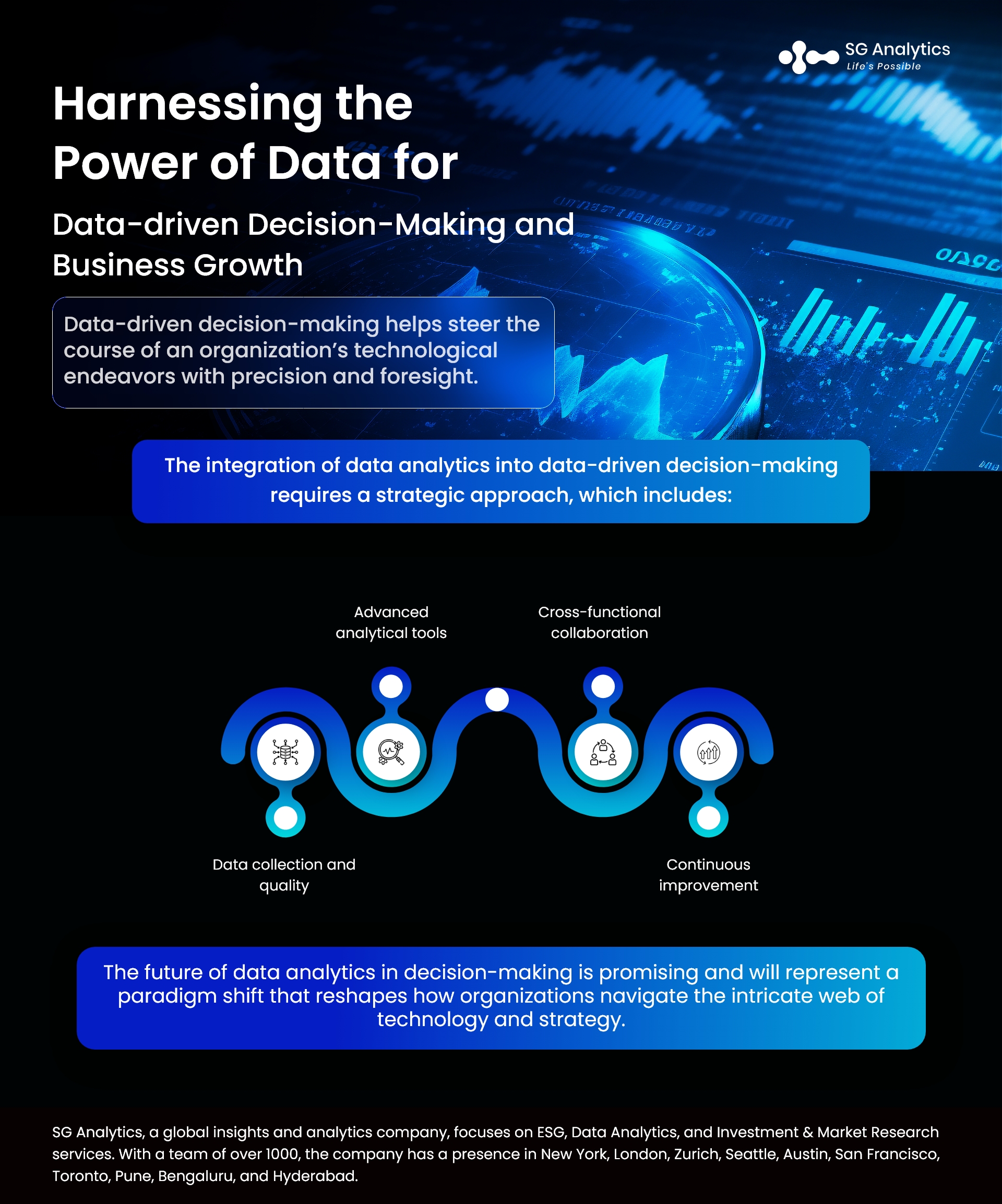The technology landscape is constantly changing as customers' expectations of businesses evolve. Behind the scenes, data is being collected across the enterprise to be translated into meaningful business intelligence.
The convergence of data analytics and IT decision-making is reshaping how organizations operate and thrive in today's competitive landscape. Data analytics is the cornerstone of this transformation, presenting organizations with an unprecedented ability to forecast trends and uncover insights from the data generated by systems.
Harnessing the power of data analytics for informed decision-making is a technological pursuit as well as a strategic imperative for organizations. This entails understanding data as a strategic asset, employing advanced analytics tools, fostering collaboration, and continuously evolving to keep pace with today's ever-evolving technological landscape.
The significance of data within decision-making is enabling organizations to explore their transformative potential, implement strategies, and work towards building strategies to navigate the promising future landscape to strive and thrive in a data-driven era.
Read more: Where Data Meets Dominance: Unleashing the Power of Data
Implementing Data in Decision-Making
In today's data-driven landscape, the fusion of data analytics with IT decision-making is becoming a catalyst for progress. It empowers professionals to transcend traditional approaches, enabling them to proactively identify system inefficiencies while also allocating resources judiciously, strengthening cybersecurity measures, and paving the way for forward-thinking innovations.
Unfortunately, many organizations struggle to employ data to their advantage. The reasons include:
-
Over customized technology
Legacy ERP systems can be overengineered to fit an enterprise’s precise needs. This level of customization can become burdensome to maintain and scale.
-
Costly technology
Replacing the old with new, on-premise implementations can be a massive investment for organizations.
-
Misguided technology selection
Best-in-class enterprise applications and systems demand the integration of multiple technologies, and mistakes can be made in this important process, thus hampering business connections. By integrating standardized platforms, organizations might have to sacrifice desired features and tools.

-
Lack of talent
Organizations must be eager to hire a data scientist who will assist them in navigating their data. Research has highlighted that big data is among the top five most sought-after technology skills in the current talent landscape.
-
Managing expectations
If they want to hire a data expert, it is vital for organizations to recognize the lack of professionals with these niche skills. Many also need an innovator to deliver transformational analytics solutions.
Data-driven decision-making helps steer the course of an organization’s technological endeavors with precision. This involves navigating through data complexities, predicting critical roadblocks, and capitalizing on opportunities while also ensuring seamless operations, heightened security, and strategic innovation. The integration of data analytics into data-driven decision-making requires a strategic approach, which includes:
Read more: From Mess to Magic: Streamlining Data Operations for Maximum Efficiency
-
Data Collection and Quality
Ensuring the collection of relevant and high-quality data involves capturing various datasets from different systems while assuring accuracy and maintaining data integrity.
-
Advanced Analytical Tools
Investing in cutting-edge analytics tools can equip organizations to handle large volumes of data while presenting robust analytical capabilities. These tools also include machine learning algorithms, data visualization tools, and predictive analytics platforms.
-
Cross-Functional Collaboration
Foster collaboration can help integrate data from different business units while gaining a comprehensive view of the organization, enabling more informed decision-making.
-
Continuous Improvement
Integrating a culture of continuous learning and improvement will further help data teams stay updated with the latest trends and technologies.

Empowering Data Operations
In today’s digital age, data has become the lifeline of every enterprise.
Every organization has a not-so-secret weapon: data. Incredibly valuable information is generated every day from different aspects of the enterprise, ranging from research and development to supply chain, human resources, marketing, operations, customer service, and behavioral insights.
Every activity across different facets of the business provides more data. Periphery data outside of businesses’ control like social media or other public data, is equally critical.
For organizations, harnessing the power of data is imperative because of the opportunity it holds leading to competitive differentiation. When armed with the right data insights and capabilities, organizations can extrapolate meaningful insights and make strategic decisions across all business areas. In turn, these data-driven decisions help save time and money, creating new revenue streams that exceed customer expectations.
Read more: DataVersity: Embracing the Power of Unified Data Solutions
Integrating a Strong Data Strategy
A strong data strategy helps organizations map business insights, needs, and priorities to solve problems with their data. It ensures future technological decisions and business activities align with their goals. Establishing a strong data strategy and reviewing it regularly helps pave the way to informed decision-making and successful business outcomes but also positions the organization to thrive competitively.
Productivity and profitability strengthen when an organization is empowered by data. Organizations with mature data strategies can boost profitability. Organizations integrating big data and analytics into their operations can further enhance productivity and profitability rates. Cost and productivity efficiencies help the bottom line, thus putting them one step ahead.
Future-Proofing Data Investments
There are five critical elements of future-proofing any technology investment, including data and analytics.
- Organizations need to make technology investments that make them more agile, enabling them to develop and deploy quick solutions while reacting to market and competition.
- Technology investments should also offer elasticity so organizations can right-size their infrastructure and save costs while serving market needs.
- Organizations should also consider whether their data platform could help enhance their ability to innovate and lower the cost of experimentation.
- Organizations doing business worldwide need a data platform that can be deployed securely and in compliance with different regions.
- A large part of future-proofing data investment is predicting the cost of operations in the future. Escalating costs are often a major issue with organizations when they get locked into these technological choices.
Read more: Harnessing the Power of Data to Transform Business Models and Drive Growth

Conclusion
Data analytics has emerged as a game-changer across the business landscape, revolutionizing the way decisions are made and strategies are formulated. In this ever-evolving technological ecosystem, data analytics will not merely be a support mechanism but an integral driver steering the entire organization toward innovation and sustained growth.
With businesses navigating today's increasingly data-driven world, harnessing the power of data analytics will be pivotal in driving innovation, optimizing business operations, and ensuring a competitive edge. It equips them to transform raw data into actionable insights, thus making it an indispensable tool for business professionals.
It is not only about optimizing current operations but also about leveraging insights from data to anticipate future trends and carve pathways toward sustained success. The future of data analytics in decision-making is promising and will represent a paradigm shift, further reshaping how organizations navigate the intricate web of technology and strategy.
A leading enterprise in Data Solutions, SG Analytics focuses on integrating a data-driven decision framework and offers in-depth domain knowledge of the underlying data with expertise in technology, data analytics, and automation. Contact us today to make critical data-driven decisions, prompting accelerated business expansion and breakthrough performance.
About SG Analytics
SG Analytics (SGA) is an industry-leading global data solutions firm providing data-centric research and contextual analytics services to its clients, including Fortune 500 companies, across BFSI, Technology, Media & Entertainment, and Healthcare sectors. Established in 2007, SG Analytics is a Great Place to Work® (GPTW) certified company with a team of over 1200 employees and a presence across the U.S.A., the UK, Switzerland, Poland, and India.
Apart from being recognized by reputed firms such as Gartner, Everest Group, and ISG, SGA has been featured in the elite Deloitte Technology Fast 50 India 2023 and APAC 2024 High Growth Companies by the Financial Times & Statista.









